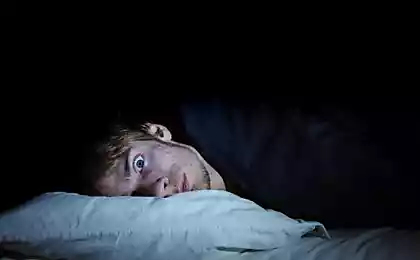180
Why you fall asleep in anxiety: insomnia and night anxiety

Is it difficult to fall asleep when there are disturbing thoughts in your head? Do you wake up at night and feel fear or anxiety coming at you? Night anxiety is a common problem that affects sleep quality and overall health. Why does it increase in the afternoon and at night, and how to cope with it?

What is nighttime anxiety?
Night anxiety is a state of increased anxiety that occurs closer to the evening or before bedtime. It is often accompanied by the following symptoms:
- Inability to relax;
- Constant scrolling in the head of negative thoughts;
- Accelerated heartbeat or feeling “coma in the throat”;
- Difficulty falling asleep or frequent awakenings
- Feeling helpless or afraid.
These symptoms not only prevent you from falling asleep, but can also lead to chronic stress and worsening overall well-being.
Why does anxiety increase in the evening and at night?
There are several reasons why anxiety becomes worse in the afternoon:
1. Mental overwork
During the day, your brain processes a lot of information. By the evening, he is exhausted, and negative thoughts begin to occupy more and more space.
2. Lack of distractions
During the day, you have a lot of things to do to distract from your worries. In the evening, when you are alone with yourself, all unresolved problems and fears come to the fore.
3. Hormonal changes
In the evening, your levels of cortisol (the stress hormone) may rise, especially if you’ve been stressed during the day. It makes you more susceptible to anxiety.
4. Irregular sleep patterns
Failure of circadian rhythms due to working at night, late falling asleep or using gadgets before bedtime can worsen your condition.
5. Physiological causes
Some conditions, such as hypoglycemia (low blood sugar) or heart problems, can cause physical symptoms of anxiety at night.
How to cope with anxiety before bed?
To reduce anxiety and improve sleep, try the following methods:
1. Set up evening rituals
Create a calm evening routine: a warm bath, reading a book, meditation or light stretching will help prepare the body and mind for rest.
2. Limit the use of gadgets
Blue light from screens suppresses the production of melatonin, the sleep hormone. Turn off your phone and computer an hour before bedtime.
3. Write down your thoughts.
If disturbing thoughts do not give rest, try to write them down on paper. This will help you get them out of your head and leave them in the morning.
4. Use breathing techniques.
Slow deep breathing helps reduce anxiety levels. Try the 4-7-8 method: inhale for 4 seconds, delay for 7 seconds and exhale for 8 seconds.
5. Reduce stimulant consumption
Reduce caffeine and alcohol in the afternoon. These substances can increase anxiety and interfere with sleep.
6. Maintain physical activity
Regular exercise helps reduce stress levels and improve sleep. However, avoid intense exercise before bed.
7. Call for help.
If nighttime anxiety prevents you from living, do not hesitate to consult a psychologist or therapist. The specialist will help to understand the causes and suggest suitable treatment methods.
When does anxiety become dangerous?
If nighttime anxiety is accompanied by the following symptoms, it is important to see a doctor:
- Frequent panic attacks;
- chronic insomnia;
- Increased anxiety for no apparent reason;
- Feeling hopeless or depressed.
Ignoring these symptoms can lead to poor health and quality of life.
Conclusion
Anxiety before bedtime is a complex but solvable condition. It signals that your body and mind need more attention and care. A conscious approach to evening rituals, reducing stress and the help of specialists will help you return a calm and high-quality sleep.
“Worry is not your enemy. It’s time to stop and take care of yourself.
Start with small changes in your daily routine, and you will notice how anxious nights turn into calm and relaxing.
11 important things to do long before the New Year holidays
What is useful emotional sobriety and how to practice it























